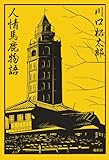
しぐれ茶屋おりく (英文版) - Mistress Oriku
"Mistress Oriku: Stories from a Tokyo Teahouse" is simply a fantastic book. A pure pleasure to read, author Matsutaro Kawaguchi has opened a window to a time in Japan's past when delight in arts and culture were refined and simplified, and when a simple bowl of chazuke, green tea over rice topped with fresh clams, could be considered a work of art.
Almost in the Jane Austen style, "Mistress Oriku" tells the story of a women from the Yoshiwara pleasure quarters who was raised from being a brothel-owner's mistress to being the proprietor of an elegant teahouse, whose customers were the leading artists and actors of the day. She falls in and out of love, experiences struggles and floods, but maintains her composure and enjoys herself along the way, taking from life the pleasures that it has to offer without guilt or complaint. Oriku's story is not one of the pathos of a prostitute, and there is no moral condemnation or political lesson to be had. There is just the joy in things beautiful and sensual, be they the warmth of a human body or a steaming cup of heated sake.
Mixing fact with fiction, Kawaguchi has populated Oriku's teahouse with the greatest figures of kabuki, rakugo, gidayu chanting and other refined entertainments from the era. Although they will probably not be familiar to the reader, the depth of information lends a air of authenticity to the story. Like an Austen novel, it makes one want to go back to that half-fantasy time, and experience the love and sensation forever lost in the modern vulgar era. To help guide you, a glossary is included in the back of the book that gives the background on several of the figures that drift in and out of the story, both real and imaginary.
Royall Tyler's translation is flawless, as one has come to expect from him, and one can even sense the underlying Japanese phrases in his English. The rhythm and flavor of the language has been maintained, as has been the subtlety and beauty. His translation is as much a work of art as the novel itself.
The only slight complaint about "Mistress Oriku" is the ending. The entire book is one of beauty and pleasure, and only at the end does the harsh reality of the encroaching modern world rear its ugly head. While this may be honest historically, it represents a sharp departure from the tone of the rest of the novel, and seems to be included only because of the rule that Japanese novels are not allowed happy endings.

名刀美女丸 [DVD]
刀鍛治の清音(花柳章太郎)は、孤児だった自分を本当の息子のように育てて
くれた小野田小左衛門(大矢市次郎)のために刀を作る。ところが、藩の公務
中に暴漢に襲われた際、その刀が折れ、小野田は、謹慎を命じられてしまう。
さらには、同僚の男が、小野田の娘、笹枝(山田五十鈴)との結婚と引き換えに、
小野田の謹慎を解くと持ちかけたことで言い争いになり、挙句斬られる。小野
田の死が、すべて自分の作った刀にあると自責の念にかられた清音は、一
時自暴自棄になるが、仇討をしたいという笹枝に励まされ、精根を込めて新
しい刀を作る。
溝口健二が、終戦の年に作った芸道的要素を含んだ時代劇。製作をマキノ正
博、脚本を川口松太郎というビッグ・ネームが担当している。後年、溝口自身
は、戦時のゴタゴタ中に短期間で作られものであり、「今更いうことないね」
と素っ気なく語っているが、短いながらも、きちっとまとまったプログラム・ピク
チャーだ。
恵まれない製作環境にもかかわらず(国による内容の審査、限定的な生フィル
ム配給や人材の不足など)、溝口作品らしい美しいフォルムの逸品に仕上がっ
ている。お得意の長廻しの演出が何と言っても印象深い。清音と弟弟子(そこ
に、笹枝の幻も加わる)が、ひたすら鋼を熱し、刀を叩き延ばしていく鬼気迫る
場面の精神的高揚(プロパガンダ的目的を超えて美しい)、ラストの長い横移
動の仇討場面の流麗なダイナミズム…。まさに、溝口演出の独壇場だ。クロ
ーズアップを嫌う溝口なので、残念ながら、可憐な山田五十鈴(撮影時28歳)
の美しい顔は拝めないが、フルショットの立ち居振る舞いからは、凛とした美
しさが滲み出している。
本DVDは、16mm原版より、HDテレシネ、レストアされたマスターを使用。16
mmということで(35mm原版は残存していない)、若干、輪郭のシャープさには
欠けるが、キズ、コマ飛びなどが一切なく、時代を考えると驚異的な画質だ。
音声も若干、こもるような箇所もあるが、総じて明瞭。特典には、新藤兼人監
督のインタビューが収められており、本作と溝口という人間を語っている。

人情話松太郎 (文春文庫)
天才子役から大女優として銀幕で活躍した高峰秀子と、謎の出生で貧しさから這い上がり、戦後の劇作家、「愛染かつら」などの多数の映画の脚本を手がけ、小説家として活躍した川口松太郎。世代は違いますが、旧知の仲である2人が色んな事を喋っている読んでいて胸がスッとするような内容です。
特に秀逸だったのは、生前の川口松太郎が息子故・川口浩に言った「嫌いな連中には葬式には来てほしくないから、参列して欲しい人の名前だけ生前に書いておくのでそれ以外の奴は来ちゃいけねぇ」のくだりや森光子の「放浪記」の作者林富美子との暖かな会話の想い出や、また高峰秀子の提案で、成人になったら1年間ボランティアをやって、違う環境の人達と交流し思いやりの心を育(はぐ)んでいくという、実践したら良いと思えるような事も語られています。
それにしても川口松太郎の残した小説などが絶版になっているのは惜しい限りです。「歌舞伎役者」という小説は、江戸っ子の幼馴染が1人が歌舞伎役者にもう1人は小説家になるという友情の話で、これはほぼ実話で、悩んでいる歌舞伎役者志望の少年に、「大幸福じゃないか」と励ます小説家志望の少年。「大幸福」こういう豊な精神を持った人達が生きていた時代があったという事に感嘆するのみです。読みやすい文体なので関心のある方はオークションや図書館などで捜してみたらいかがでしょうか?

人情馬鹿物語
文庫及び新書共に絶版または重版未定古書店を巡っても川口松太郎に出遭うことが出来ず、図書館にてお取り寄せ。古い本だし、本人含め関係者が亡くなっている以上、この本に書かれていること全てが真実だとは言い切れないのだが、事実だと思って読めば読むほど面白い。
川口松太郎氏が小説家になる前に講談速記の悟道軒円玉の速記の手伝いをしながら2階に居候をしていた頃の自分と円玉と出入りする人々を巡る人情馬鹿を綴った短編集。悟道軒円玉は松林伯円門下の講談師だったが、体が弱かったことで芸人をやめ、速記術を覚えてその頃の新聞雑誌に講談速記の連載を試み成功した人だそうだ。松林伯円は小猿七之助や鼠小僧などの講談を作った名人で、単なる芸人ではなく、立派な創作家だった。深川・森下に住み暮らしていた頃が全盛期で主にその頃のことが書かれている。『紅梅振袖』『春色浅草ぐらし』『七つの顔の銀次』『彼と小猿七之助』この四編が好みです。







